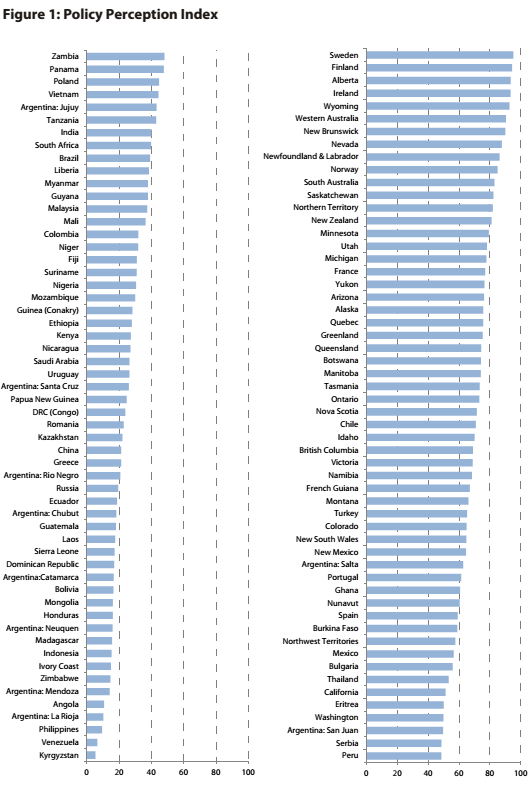 |
| To no one's surprise, investors say Sweden has the best mining policies. |
More so than the amount of extractable resources or the economic conditions in a particular country, I'd argue that the political climate is more important in determining its attractiveness to investors. Even in this day and age, mining remains a key industry, especially since many high-tech goods rely on certain minerals. Nor have we moved into a post-hydrocarbon age for powering the world economy. Canada's Fraser Institute produces an annual survey that ranks countries on these criteria, and the
latest one shows definite trends. In general, developing countries with their poorer governance lag behind developed ones. Indeed, those concentrated at the bottom and the top are instructive. In general, poor performers have some shared characteristics:
- The leaders are leftist nutters who may expropriate you at any time;
- Mining regulations are unclear regarding what areas can be mined, what areas are protected and what the government's share of the revenues are;
- Other rules regarding the environment and foreign direct investment are similarly unclear.
In other words, highly uncertain political environments tend to rate lower regarding policy perceptions. Here is a brief description from the Fraser Institute:
Policy Perception Index: A “report card” to governments on the attractiveness of their mining policies. While geologic and economic considerations are important factors in mineral exploration, a region’s policy climate is also an important investment consideration. The Policy Perception Index (PPI), referred to in previous surveys as the Policy Potential Index, is a composite index, measuring the overall policy attractiveness of the 112 jurisdictions in the survey. The index is composed of survey responses to policy factors that affect investment decisions. Policy factors examined include uncertainty concerning the administration of current regulations, environmental regulations, regulatory duplication, the legal system and taxation regime, uncertainty concerning protected areas and disputed land claims, infrastructure, socioeconomic and community development conditions, trade barriers, political stability, labour regulations, quality of the geological database, security, and labor and skills availability. The PPI is normalized to a maximum score of 100.
And here is the entire policy perceptions ranking. As usual, it is galling that countries that could benefit the most from stable and predictable mining policies are those which do worst:

